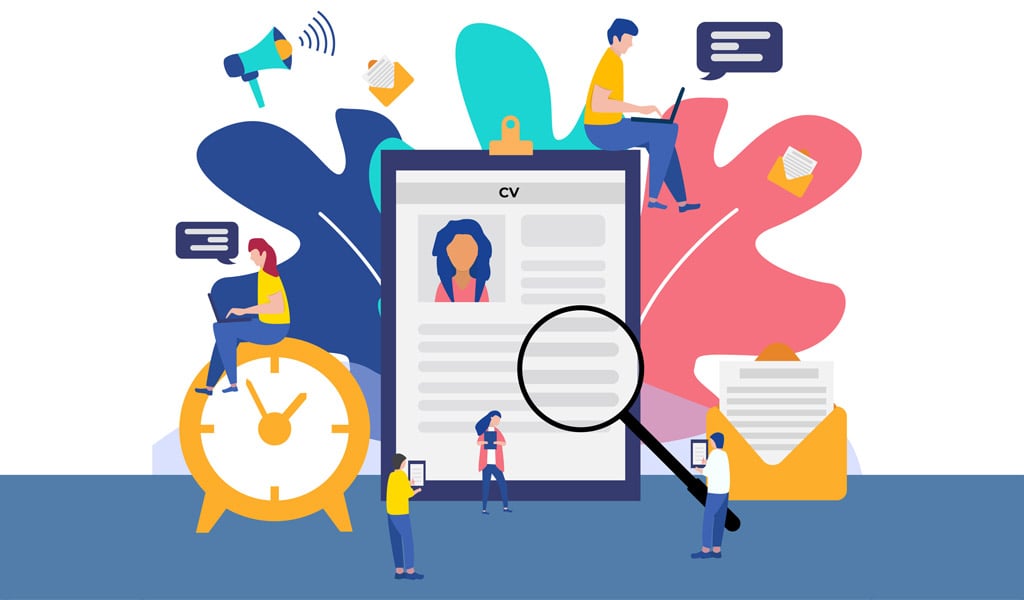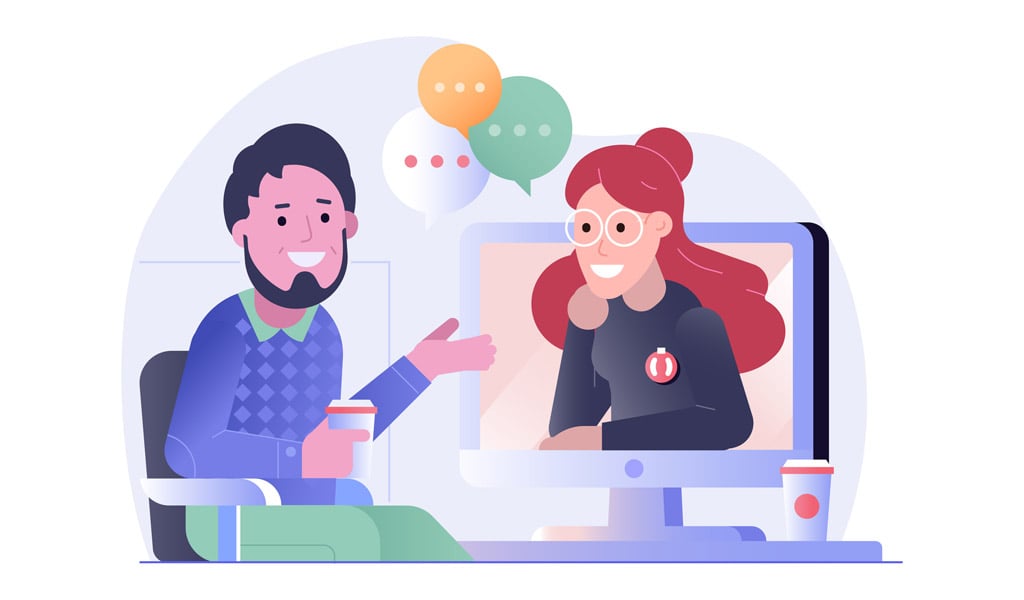
For most of us, interviews are anxiety-inducing events. You have a short timeslot, usually 30 mins to one hour, to communicate everything great about you. You have to get across why you are a good fit for the job, that you have the necessary skills, and will add value to the organization. And you have to do all of this while coming across as friendly, personable, and confident.
You might have heard the notion that interviews are something you’re good at, or you’re not. This is false. Sure, some people have a natural confidence that doesn’t falter under interview conditions. Some people even thrive with this kind of pressure. But confidence is only one aspect of the equation. Confident people still have to convey the same positive qualities and competence as more anxious people. There is a formula for succeeding in customer service interviews, and that’s what we’re going to look at today. Want to know how to nail your next customer service interview? You’re in the right place.
Common Customer Service Interview Questions
Before we get started on the tips, we must look at the kinds of questions you’ll be asked. A crucial part of interview preparation is ensuring (as much as is possible) that you won’t be caught off-guard. When we’re surprised by a question, several things can happen:
- We pause unexpectedly.
- Our confidence falters.
- We ramble as our brains scramble for any relevant information.
Of course, some pesky interviewers might try to throw you an unexpected question on purpose. Why? Because they want to see how you act under pressure and whether you can think on your feet. This adaptive and dynamic thinking under pressure is something you’ll have to do while working in customer service. You can study every piece of customer service training material out there and still encounter surprising, or even downright weird, customer problems.
We’re trying to say that you can’t eliminate your chances of receiving unexpected questions, but you can reduce your chances by preparing for as many questions as possible. With that in mind, here are some of the questions you can expect.
How would you define good customer service?
Why they’re asking:
They want to see if you have a good understanding of what customer service is and what it looks like in action.
Tips for answering:
Give a short definition of customer service. It’s about making customers happy, meeting their expectations, and sometimes exceeding them. The goal is to ensure customers leave satisfied at the end of the interaction.
You can also focus on the elements that make up good customer service, for example:
- Knowledge of the product or service.
- A positive attitude.
- Efficiency – arriving at a solution in a timely fashion.
- Problem-solving.
You might see a variation of this question such as “What does good customer service mean to you?”.
Why do you think you’ll be a good fit for our company?
Why they’re asking:
They want to see whether you have prepared for the interview by researching the company. They also want to see whether your personality and values will mix well with the company culture.
Tips for answering:
Focus on what you know about the company and relate your answer to customer service. For example, if they sell IT services, you can say that you have a passion for technology and want to be a part of a forward-thinking and innovative company. But you should also focus on the human-customer service aspect. For example, you can say that by looking at the company’s social media accounts, you’ve noticed that they prioritize warm and friendly interactions and fast responses – something that you prioritize too!

Why do you want to work in customer service?
Variations of this question could be “what appeals to you about this role?” or “why do you like working in customer service?”.
Why they’re asking:
They want to see whether you have the necessary soft skills for the job and whether your motivations are in the right place.
Tips for answering:
Focus on conveying a combination of your soft skills and your drive/motivation for the role.
- Soft skills – Active listening skills, problem-solving, conflict resolution, remaining calm under pressure and thinking on your feet.
- Motivation – You feel a great sense of satisfaction when you find the right solution for customers. It spurs you on to know they have left happy.
What’s the best customer service you’ve ever received?
Why they’re asking:
They want to see if you can identify good customer service when you see it. If you don’t have an excellent example of excellent customer service, how can you deliver it yourself?
Tips for answering:
The key here is to give an example and explain how that interaction made you feel. Some interviewees make the mistake of thinking the goal should be to think of the most awe-inspiring example of customer experience out there and claim it as their own (even if it didn’t happen to you). The company isn’t looking for tips on providing better customer service; they want to know that you understand the impact customer service has on customers. Your example can be impressive or straightforward.
- Example 1 – I bought $400 headphones, and three years later, when they broke, the company sent me a brand-new pair even though I was out of warranty. This was totally unexpected, and I was elated. I will never buy headphones from anywhere else – they have a customer for life.
- Example 2 – I asked a shop assistant for help buying skincare products for my skin type. She was accommodating and attentive, listening to all of my concerns and helped me find the right product. When I revisited the store six months later, she remembered who I was! This made me feel special.
Tell me about a time you’ve dealt with a demanding customer and how you handled it
Why they’re asking:
They want to see your method for dealing with demanding customers. They will be looking for the active things you do (listening, displaying empathy, validating the customers) and the passive (did you remain calm and avoid becoming defensive?).
Tips for answering:
- Explain why the customer was displeased and how they felt (angry, upset, frustrated).
- Talk through your approach. Did you ask them to explain the problem in detail? Did you display empathy by saying, “I can see why you’re upset about that. That must be frustrating”.
- Explain the solution you came up with. You can also detail any recommendations you made to management to avoid this situation happening again, if applicable.
10 Tips For Customer Service Interviews
1. Ask Good Questions
Remember, interviews should be two-way discussions. When you have a natural back and forth with the interviewer, everyone feels more comfortable. When you ask questions, you’re also communicating that you are trying to visualize the job and yourself in it – you’re highly engaged and interested. Here are some questions to ask:
- What do you like about working here?
- What’s it like to work here?
- How do you evaluate performance?
- What does a typical day look like?
- What are your expectations of me?
2. Be Decisive and Flexible
It’s a good idea to treat every interview as your one and only shot at getting the job. Don’t leave anything for after the interview. For example, if they ask whether you can come back on Friday for a second interview, don’t say, “I’m not sure, I’ll have to get back to you on that”. An answer like that can make you seem unenthusiastic. Be prepared to be flexible to meet their schedule.
3. Use Their Language
Use the same language that they do. When you find out you’ve got the interview, go back to the job advert, highlight the language they use, and memorize it. Using this language in the interview will communicate that you’re on the same page as them. If you talk like them, then they’ll think you’re one of them.
4. If You Don’t Know, Ask for Clarification
If you’re hit with a question you don’t know the answer to or one you don’t understand, ask more questions. If you ask questions back to them for clarification, they might even ask you a less restrictive and easier to answer question. They’re not looking for you to be a genius. It’s better to ask more questions to ensure you’re answering the right question than to make assumptions and guess your way through it. If you do the latter, they might be concerned that you won’t be confident enough to ask customers for clarification when you’re confused about their complaint.

5. Tell Them You Want the Job
Most candidates forget to do this. They think just being present is evidence that they want the job. You can set yourself apart by being enthusiastic. Tell them that you want the job, it seems like a great place to work, you think you could add value, and you’re excited to hear back from them. The enthusiastic ones will get selected if the interviewers are trying to pick between multiple similar and equally competent candidates.
6. Be a Good Communicator
One of the things they will be looking for is how well you communicate. This means:
- How well you understand questions and give appropriate answers.
- Whether you can articulate how you will add value.
- That your answers are an appropriate length – Too short, and it can mean you lack confidence or knowledge of the topic. But equally, very long answers show that you don’t know how to be concise and condense your thoughts.
7. Be Energetic
They are looking for your energy level. This means things like:
- Are you positive?
- Do you look happy to be there?
- Are you warm and friendly?
- Are you looking them in the eye and listening to the interviewers?
8. Communicate You are a Good Culture Fit
They will also be looking for how good of a match you are for the team, department, and the company as a whole. To pull this off, you need to know what they’re looking for. Look at what they post on social media or the language they use in their company descriptions and job adverts. If they pride themselves on being modern/laid-back/fun, then you might want to communicate your fun hobbies. You can also dress in a more smart-casual way.
9. Research Your Interviewer
You won’t always be told who is interviewing you, but often you will. Research this person by looking them up on LinkedIn and reading about their experience, hobbies, and groups. The key here is not to be creepy. Don’t walk into an interview and say, “oh, I noticed your wife had a baby recently, congratulations”. But if you find similarities like you and the interviewer went to the same university, play the same sport, are interested in the same types of activism, then you can focus on those things to strike up a connection.
10. Make Friends With Everyone
Remember, when your interview starts from the moment you enter the building. Be friendly and talkative with the receptionist, the other candidates, and the other employees you encounter before the interview. You never know when your interviewers are watching or whether the receptionist is close friends with the interviewers.